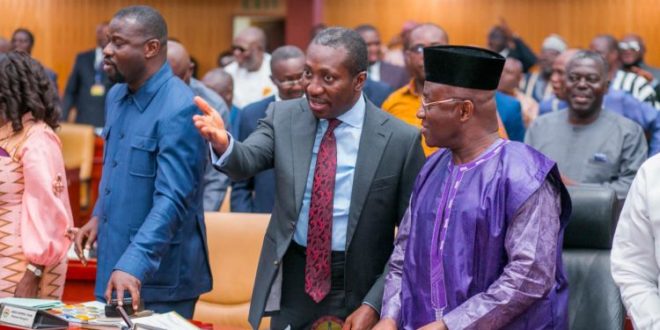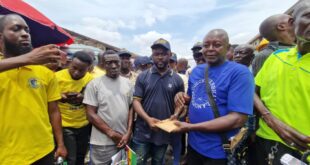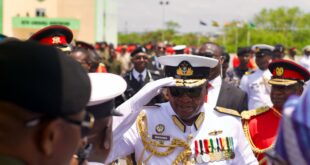The proposed reshuffle of the Majority leadership in Parliament has been temporarily suspended. This pause is strategic, allowing President Nana Akuffo-Addo and the leadership of the New Patriotic Party (NPP) to undertake thorough consultations with the Majority Caucus.
The decision to temporarily halt the intended changes underscores the necessity of aligning any leadership reshuffle with the delicate legal framework of the new Standing Orders of Parliament.
The reshuffle, originally set to be unveiled on Monday, was a prominent item on the National Executive Committee and National Council meetings’ agendas at the Alisa Hotel in Accra.
Sources say the current Majority Leader and Minister for Parliamentary Affairs, Osei Kyei-Mensah-Bonsu is poised to be succeeded by Alexander Afenyo-Markin, who currently serves as the Deputy Majority Leader. While it remains uncertain if Kyei-Mensah-Bonsu will retain his ministerial role, he is anticipated to take on the responsibility of chairing the NPP’s 2024 Manifesto Committee.
In the wake of these impending changes, Frank Annoh Dompreh, the incumbent Majority Chief Whip, is rumoured to be stepping up as the new Deputy Majority Leader. This shift would open the position of Majority Chief Whip for Habib Iddrisu, who presently holds the office of the First Deputy Chief Whip.
The intended reshuffle also includes the likely appointment of either Patricia Appiagyei or Freda Prempeh as the new First Deputy Majority Chief Whip, following Lydia Seyram Alhassan’s recent nomination as Minister for Water Resources and Sanitation by President Nana Akuffo-Addo.
Additionally, the role of Second Deputy Chief Whip is expected to be filled by Alex Tetteh Djornobuah, the Member of Parliament for Sefwi-Akontombra.
However, the plan was recalibrated, removing the reshuffle from the agenda for Monday’s meeting.
A reliable source disclosed to Citi News, “In a meeting with the President on Monday, the current Majority Leader agreed in principle to step down from his position. However, it was also decided in that meeting that, considering the new Standing Orders, the President and the party’s leadership must consult with the parliamentary caucus of the party before any proposed changes are implemented.”
Sources close to the Jubilee House suggest that a meeting is being planned for either Wednesday or possibly Tuesday. The aim of this gathering, as one source at the seat of government explains, is for President Akuffo-Addo and the NPP leadership to “discuss the proposed changes with the Majority caucus so as to ensure their support and agreement.”
This consultative requirement stems from the legal provisions underpinning Ghana’s parliamentary procedure. In particular, Order 6 of the Standing Orders of Parliament grants the Majority Caucus the power to designate the Majority Leader.
This clause underscores the importance of caucus consensus in such appointments. Interestingly, the provision does not explicitly address the appointment of the Deputy Majority Leader, Majority Chief Whip, First Deputy Majority Chief Whip, and Second Deputy Majority Chief Whip, leaving room for interpretation and party-specific procedures.
Insiders say President Akuffo-Addo’s decision to involve the caucus directly in the reshuffle process reflects a deep understanding of the legal and democratic nuances involved.
“It’s a move indicative of a broader commitment to uphold democratic principles within the party’s decision-making processes,” one source told CitiNews. “This approach not only aligns with the procedural requirements set out in the Standing Orders of Parliament but also resonates with the ethos of inclusive and lawful governance,” the source added.
Traditionally, the selection of parliamentary leadership within the NPP has been the prerogative of the party’s National Council, as outlined in Article 14(2) of the party’s Constitution. This process was in line with Order 7 of the old Standing Orders of Parliament, which vested the authority to choose leaders for the Majority and Minority in the party leadership.
However, the recent revision of these Standing Orders has dramatically shifted this dynamic, transferring the authority to the Majority and Minority Caucuses in Parliament.
The legal framework governing this delicate process is anchored in several key provisions, encompassing the 1992 Constitution of Ghana, the Standing Orders of Parliament, and the NPP Constitution. Each of these legal documents plays a pivotal role in shaping the decision-making process in this context.
One critical aspect is the supremacy of Ghana’s Constitution, as articulated in Article 1(2), which declares it the highest law of the land. Any law found inconsistent with the Constitution is void to the extent of the inconsistency. This principle is particularly relevant when conflicts arise between party constitutions and parliamentary procedures.
Article 11 of the 1992 Constitution, which establishes Ghana’s legal hierarchy, prioritises parliamentary enactments, placing the Standing Orders of Parliament within the nation’s legal framework. Consequently, these Orders supersede internal party regulations, such as those of the NPP.
The revised Standing Orders of Parliament, specifically Order 6, redefine the “Majority Leader” as a member designated by the Majority Caucus, thus emphasising the Caucus’s role in selecting its leader. This contrasts with the NPP Constitution’s Article 14(2), which assigns the selection process to the National Council, leading to a potential constitutional inconsistency.
However, some lawyers say the NPP Constitution offers a solution to the apparent inconsistency through Article 10(3), which empowers the National Council to issue directives for running the party in between meetings of the annual National Delegates Conference of the party. This suggests that while the National Council cannot directly appoint parliamentary leadership, it can influence the caucus’s decision-making process by issuing a directive.
Additionally, Article 5 of the NPP Constitution mandates members, including MPs, to adhere to party decisions, reinforcing the party’s influence over parliamentary leadership choices.
However, this route was not engaged at Monday’s meeting. Instead, the party leadership chose to put the proposed changes on hold until after the President and the party leadership met with the Majority Caucus before the close of the week.
Insiders say a long-term solution to the legal issues would require the NPP to amend Article 10 of its Constitution to align with the new Standing Orders of Parliament. Such an amendment would streamline the process of selecting parliamentary leadership, ensuring legal conformity and party coherence.
THANK YOU for constantly reading stories on MyGhanaMedia.com, a news publishing website from Ghana. Kindly like, follow, comment, and SHARE stories on all social media platforms for more entertaining updates!
Follow us on Twitter: https://twitter.com/
Source: Citinewsroom
There are four types of content published on MyGhanaMedia.com daily: curated content; syndicated content; user-generated content; and original content.
 MYGHANAMEDIA.COM Best Source Of Latest News
MYGHANAMEDIA.COM Best Source Of Latest News





